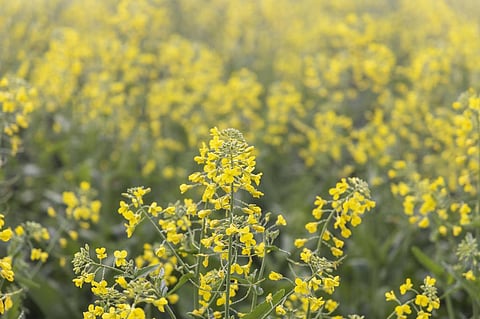

India saw extreme weather events on almost half of January and February 2023 — 28 out of 59 days, according to India’s Atlas on Weather Disasters of the Down To Earth-Centre for Science and Environment Data Centre.
The events claimed eight lives and affected 389,127 hectares of crop area with cold waves/cold days and hailstorms. The crop area loss was reported in just January 2023. A closer look at the CSE atlas shows that the loss to crop area this year was 13 times more than in the same period last year (January-February 2022).
The cumulative country-wise or state-wise figures by the government on the loss of cropped area due to extreme weather events are not available in the public domain for January and February. So, the CSE-DTE Atlas arrived at these estimates for this period based on credible media reports that cited government figures.
Haryana reported the most damage — 347,117 ha. Frost damaged the mustard crops, according to a government report cited in a media report and referred by the Atlas.
Rajasthan reported the second-highest damage to crops, where at least 42,000 ha of the wheat crop was damaged due to hailstorms. This was followed by Punjab, where a cold wave affected at least 10 ha of potato crops.
Extreme weather events claimed eight lives in Uttar Pradesh, Jammu and Kashmir and Ladakh, according to the Atlas based on the monthly climate summary of the India Meteorological Department (IMD).
Four people died due to a cold wave in Uttar Pradesh and four people died due to snowfall in Jammu & Kashmir and Ladakh.
In comparison, 22 deaths occurred in Himachal Pradesh, Arunachal Pradesh, Jammu & Kashmir and Maharashtra in January-February 2022 due to heavy rains, snowfall and lightning. No death was recorded due to a cold wave or cold day in January 2022.
Interestingly, IMD’s monthly climate bulletin claimed to use media reports for data on human deaths due to significant extreme weather events. IMD is the principal agency responsible for meteorological observations, weather forecasting and seismology in the country
India recorded cold waves/cold days on 21 of the 59 days in January-February 2023 across 17 states/UTs. There were cold waves/cold days on 30 days across 14 states/UTs in the same period in 2022.
In the winter season of 2023, the cold wave lasted for 35 days, compared to 43 days in the winter season of 2022. Both months had fewer cold waves/cold days this year.
There were 20 cold wave/cold days in January 2023, compared with 22 days of cold wave/cold days in 2022. There was just one cold day in February 2023, as compared to 8 days of the cold wave/cold days in 2022.
India recorded its hottest February since 1901 this year, said the IMD. This has been due to the absence of winter rain caused by weak western disturbances, clear skies and anticyclones. The country received 68 per cent less than average rainfall this February.
This sets a precedent for a blistering summer with the ‘enhanced probability’ of heatwaves between March and May, alerted the IMD.
While the country recorded fewer cold waves/cold days, the database shows that Karnataka, Sikkim, Telangana and West Bengal had not witnessed cold waves/cold days in January 2022, but experienced cold conditions in January 2023.
Of these, Karnataka experienced cold waves/cold days on four days in January 2023. According to IMD records, the state has not recorded cold waves/cold days since 1980.
Just one cold wave day was witnessed and recorded by the IMD during 1971-79 as per EnviStats India-2022 Volume I published by the Union Ministry of Statistics and Programme Implementation.
This means Karnataka, in the southern region, has witnessed extreme cold events after a gap of over four decades.